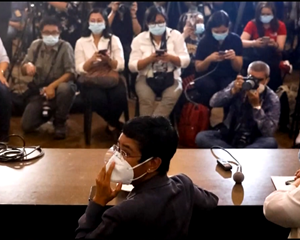JUDY WOODRUFF: One week ago, a court in the Philippines convicted one of the country's most prominent journalists of cyber-libel. Press freedom advocates quickly called the trial unfair and part of a larger crackdown by Filipino President Rodrigo Duterte on critical media, and his political opponents. Nick Schifrin picks up the story of Maria Ressa.
NICK SCHIFRIN: Maria Ressa is a Filipina-American journalist who was once TIME magazine's person of the year and used to be CNN's Manila bureau chief. She founded Rappler, an independent news site that investigates Duterte without fear or favor. In 2012, Rappler published an article linking a businessman connected to Duterte with illegal drugs and human trafficking. Since then, Ressa has been charged with multiple crimes that her lawyers call politically motivated. All of those charges add up to as much as 100 years in prison. And Maria Ressa now joins me from Manila. Maria Ressa, what's the state of press freedom in the Philippines?
NICK SCHIFRIN: We haven't only seen attacks on journalists. We have seen attacks on the Supreme Court chief justice, on prominent legislatures, and, of course, the war on drugs, which the U.N. calls a murderous crackdown that's killed more than tens of thousands. Is this part of a trend in the Philippines?
MARIA RESSA: Absolutely. And it's two. The first is really, when we saw in 2016, the weaponization of social media. So the attacks are coming exponentially bottom up. And then it comes top down by weaponizing the law. The law is the tip of the arrow that is used to attack perceived critics. I'm not a critical journalist, in the sense that I didn't set out to criticize President Duterte. I just set out to do my job, to hold power to account.

NICK SCHIFRIN: And what the president says is that there's a lot of crime that he needs to crack down on, and that's his defense. And the president's allies also point out that there is a commission now to investigate some of the murders against journalists.
MARIA RESSA: Of the tens of thousands…this is the U.N.'s estimate…of people killed in the drug war, there's only been one conviction of a case that's been brought to court of police. It is impunity. And then on the second front, in terms of journalists, we have seen exponential lies, just my case alone. I don't have to go very far. All I have done is to do my job. This case should have been thrown out of court, because the law we allegedly violated wasn't even in effect at the time that that story was published. The kind of legal acrobatics to bring this to court and to have a conviction are mind-boggling.
NICK SCHIFRIN: What the government says is that the article was edited after the law came into effect, and that the cyber-crime law specifically has no statute of limitations, and that's what you were convicted of.
MARIA RESSA: Both are wrong, essentially, because, in 2014, someone in Rappler fixed a typographical error. They fixed one letter of one word. It's a typo. And, for that, myself, I and one of my former colleagues can go to jail for six years. That's the first. The second is the statute of limitations for libel…the Constitution is very clear on this…it's one year. Our laws are clear. And yet, to convict us, it was changed. The judge, Judge Montesa's court says, it's now 12 years.
NICK SCHIFRIN: The issues of press freedom in Asia are larger than in the Philippines. The day that you were convicted, I talked to Steven Butler, the Committee to Protect Journalists' Asia coordinator. And this is what he said.
STEVEN BUTLER, Committee to Protect Journalists: You have seen it across the board, in Cambodia, in Malaysia, Philippines, Thailand. India has been terrible. So this is part of a broad trend that…and that has forced press freedom further into retreat from what we have seen in recent years.
NICK SCHIFRIN: Why is that retreat happening, do you think?
MARIA RESSA: I think of two reasons. The first is that our information ecosystem has fundamentally changed with the power of technology. So, starting in 2016, we pointed out that these cheap armies on social media are literally changing the facts, right? And it's not just in the Philippines. It's in the United States. What we…what has happened here is happening to you. So, when facts are debatable, then you have no integrity of anything. The second reason is because there's almost like a dictator's playbook that we're seeing all around the world. They're using the vulnerability of the information ecosystem, social media, and they…what we thought would be an enabling and empowering tool has now turned into a despot's tool.
NICK SCHIFRIN: You mentioned the United States. The U.S. State Department did release a statement the day after you were convicted decrying the case. Has the U.S. done enough?
MARIA RESSA: We would like to see more of the ideals of the United States. The rest of the world has felt a little bit of its absence in terms of press freedom issues. Having said that, no matter what the U.S. or any other country says, this is a Filipino problem. And Filipinos must step up and demand their rights. Otherwise, we're going to lose it.
NICK SCHIFRIN: Maria Ressa, thank you very much.












